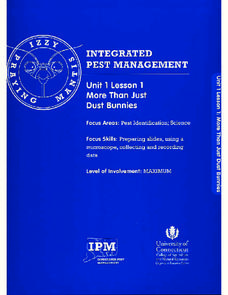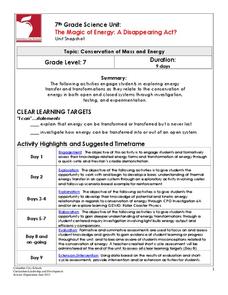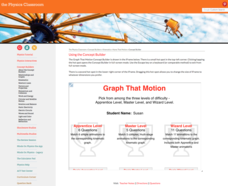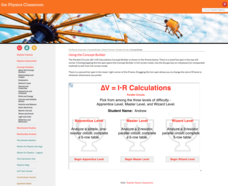National Park Service
Leave it to Beavers
Many people know cats mark their territories by rubbing the back of their necks to leave a scent, but not many people know beavers also leave a scent to mark their territories. During the first activity of two, scholars use their noses...
Rainforest Alliance
Sounds of the Rainforest
Do you hear what I hear? Encourage scholars to use their listening skills and participate in a series of activities that demonstrate how the sense of hearing is crucial to the human and animal world. Activities guide learners on nature...
National Park Service
Subalpine Web
The theory of keystone species in an ecosystem was first established in 1969 by Robert T. Paine. Pupils open the final lesson in a five-part series with a game guessing which member of the alpine ecosystem they are based on clues. After...
It's About Time
Adaptations
Congratulations! You exist, thanks to the wonders of biology and adaptations. The focus of the lesson explains many adaptations of plants and animals and how the environment has influenced the process. A hands-on activity demonstrates...
It's About Time
How Do Plate Tectonics and Ocean Currents Affect Global Climate?
What do plate tectonics and ocean currents have to do with global climate? This fourth installment in a six-part series focuses on how plate tectonics and ocean currents affect global climate, both now and in the past, outlines an...
University of Connecticut
More Than Just Dust Bunnies
Teenagers will never complain about cleaning their rooms after this activity. In the first lesson of a four-part series, budding scientists collect samples of dust, chalk, and other particulates from various areas of the classroom. They...
Chicago Botanic Garden
Understanding the Greenhouse Effect
The greenhouse effect is important, for without it, life on Earth would not exist. An activity that includes modeling the greenhouse effect and acting out the Earth's energy balance makes up the first part in a series of seven lessons....
Cornell University
Spectral Analysis with DVDs and CDs
Build a spectrometer to analyze properties of light. Scholars examine the spectrum from CDs and DVDs from two different light sources. Using the spectrum, they work to identify different elements.
Physics Classroom
Vector Direction
Scholars practice vector direction notation in multiple formats. After mastering each individually, they work to convert from one to another as one part in a series of lessons on vectors and projectiles.
PBS
Exploring the Drive to Create in Frankenstein
Is it hubris that drives the creative process? Is it the desire to be remembered long past death? An interactive asks readers of Mary Shelley's novel Frankenstein and Percy Shelley's poem "Ozymandias" to consider what this wife and...
Curated OER
Universal Gravity and Kelper's Laws Worksheet
High school physicists apply their knowledge of planetary motion. Using Kepler's three laws, Newton's law of universal gravitation, and the provided properties of the moon, sun, and Earth, they proceed to solve 23 problems. An answer key...
Chymist
The Extraction and Identification of Artificial Food Colors
Did you know some food dyes are considered safe while others are considered carcinogenic? During the experiment, young chemists extract artificial food colors from prepared foods. Then, they use chromatography paper to identify which...
Curated OER
Teaching About Plate Tectonics and Faulting Using Foam Models
Young scientists learn about plate tectonics and the three different types of faults (normal, reverse, and strike-slip) using foam models. The activity also covers common types of locations where these faults are found.
Columbus City Schools
The Magic of Energy: A Disappearing Act?
Using the 5E method for teaching about kinetic energy, potential energy, and conservation of energy, this two-week unit with many videos and possible extensions is sure to keep pupils engaged as they are learning.
Physics Classroom
Trajectory - Horizontally Launched Projectiles
Everyone enjoys projectiles, and predicting where they land helps with future hands-on labs. Incorporating gravity into horizontal trajectories through both conceptual and mathematical practice helps scholars understand real-life...
Physics Classroom
Resistance Ranking Tasks
Resistance is not futile ... it is voltage divided by current. Scholars apply their knowledge to a series of ranking puzzles. First, they consider wires of varying lengths and then wires of varying cross-sectional areas. Finally, they...
Physics Classroom
Vector Addition
Three levels of practice assure scholar mastery of vector addition. After inputting an incorrect answer, another problem replaces it so everyone finds success. The lesson works as one part of a series on vectors and projectiles.
Physics Classroom
Graph That Motion
Pupils apply their knowledge of the shape and slope of graphs to interpret the motion of an object. Three levels of difficulty provide plenty of practice with support thanks to the "Help Me!" button offered with each question.
Physics Classroom
Position-Time Graphs - Conceptual Analysis
Increasingly, colleges and employers want applicants with strong conceptual analysis skills, so give them some practice! Applying these skills to position-time graphs encourages synthesis of knowledge. To complete an installment of a...
Physics Classroom
Parallel Circuits - ∆V = I•R Calculations
Parallel circuits often provide less of a challenge for teens than parallel parking. An installment of a series on parallel electric circuits requires learners to solve increasingly difficult levels of calculations. Each level provides...
Physics Classroom
Motion Diagrams
Scholars work through three activities building motion diagrams as part of a series exploring dimensional kinematics. Each activity has six descriptions requiring application of velocity vectors, acceleration vectors, and challenge...
Physics Classroom
Up And Down
Many scholars confuse velocity and acceleration even after they correctly solve basic problems. Using an interactive, part of a series on vectors and projectiles, with immediate feedback focuses their attention on the up or down...
Curated OER
Reading Comprehension: Oceans
In this ocean comprehension worksheet, students read a short passage, then complete 4 short answer questions about oceans. Worksheet contains a link to additional activities.
Curated OER
Snowflake Bentley
Students read books and draw pictures about what a scientist does. In this scientist lesson plan, students brainstorm together of all the things a scientist does.

























